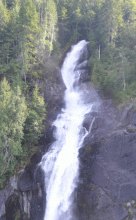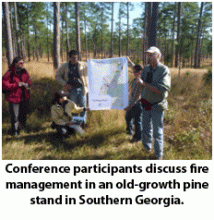Chair's Message
 I would like to begin the New Year by thanking all the people who help the Board do its job, particularly the individuals whose work becomes the subject of an audit, complaint or investigation. I understand that it is not comfortable, nor convenient to be audited or investigated, and have been impressed by the professionalism and cooperation exhibited.
I would like to begin the New Year by thanking all the people who help the Board do its job, particularly the individuals whose work becomes the subject of an audit, complaint or investigation. I understand that it is not comfortable, nor convenient to be audited or investigated, and have been impressed by the professionalism and cooperation exhibited.
Over the last year the Board found much that is going well with forest practices, but the province is not immune to changing circumstances and the need to continuously adapt and improve. This may be especially true in tough economic times when there can be a temptation to risk the long-term good for immediate relief.
I believe the Board can add value to the public dialogue in 2012 by talking more about the “big picture” – what our individual projects tell us when we add them up. In doing this we can provide better information and context to discussions about forest policy and programs.
Board Membership Changes
New Faces
New Faces


In December 2011, the Board welcomed two new part-time board members: Ralph Archibald (left) brings to the Board 40 years of experience in the natural resource sector of government.
Dr. William McGill (right) has over 40 years of academic experience, specializing in the study of biogeochemical cycles and their application to global change, sustainable land use, resource recovery and soil remediation.
Farewells

 Our sincere thanks goes out to John Dunford and Debbie Zandbelt, for their contributions to the Board and to the people of BC.
Our sincere thanks goes out to John Dunford and Debbie Zandbelt, for their contributions to the Board and to the people of BC.
John served a four-year term and brought to the Board more than 30 years of experience as a professional forester in the northern and southern interior of British Columbia.
Debbie served a five-year term and brought more than 15 years of knowledge and experience as a professional forester in appraisals, silviculture, planning and timber development.
We wish them the best in their future endeavours.
Returning Member
 Dr. Rachel Holt returns to the Board in the role of vice-chair.
Dr. Rachel Holt returns to the Board in the role of vice-chair.
Rachel has been with the Board as a part-time board member since October 2006.
NSR Update
The Board is currently writing a special report on the current status of Not Satisfactorily Restocked forests, or NSR, and the implications for the future. Board staff will be speaking about the conclusions of this paper at two upcoming events – the Western Silviculture Contractors Association AGM and the Association of BC Forest Professionals AGM. The report should be published by Spring 2012.
Appeal Leads To More Transparency In Penalty Decisions
One of the Board’s areas of work that gets less attention is our role in appeals of penalty determinations to the Forest Appeals Commission. The Board has the right to appeal to represent the public interest. The Board normally gets involved in an appeal when there is a matter of legal interpretation or where the public’s interest needs to be highlighted in an appeal – for example ensuring the public is properly recompensed for damage caused to public resources.
In 2011, the Board concluded that the reasons a delegated decision-maker (DDM) gave for not levying a penalty against a woodlot licensee were inadequate. The DDM’s determination letter indicated that the contravention for failing to achieve free-to-grow dates was significant and deliberate but, in spite of this, no penalty was levied. Without adequate reasons, it was impossible for the Board or the public to know why the DDM decided not to levy a penalty. The Board appealed, taking the position that the reasons should have addressed whether the contravention was trifling and whether it was in the public interest to levy a penalty. Inadequate reasons for a decision make it less transparent and harder to understand, and can make decision-making less consistent. In the Board’s view, this serves to undermine the public’s confidence in the appropriateness of government enforcement.
The Board looks for potential resolutions to appeals, where appropriate. Sometimes the public interest can be addressed without the necessity of a full appeal. This was such a case. After discussion with the Board, the government drafted guidance for DDMs on the importance of giving reasons. The Board’s view was that the guidance, addressing the criteria that a DDM should consider when deciding whether or not to levy a penalty, would adequately address the public interest. As a result, the Board withdrew its appeal. The Board anticipates that future penalty determinations will be improved with this guidance.
Community Watersheds
 One of the most important forest resources we have is water – over 400 communities in BC rely on streams and springs to provide drinking and domestic water supplies. The Forest and Range Practices Act sets an objective for water and also specifies practice requirements that forest companies must meet when operating in a community watershed. The Board is undertaking a new project that will look at how clear and useful government’s objective is, and how forestry plans and practices are being designed and implemented to address the objectives for water in community watersheds. Work is getting underway in January 2012.
One of the most important forest resources we have is water – over 400 communities in BC rely on streams and springs to provide drinking and domestic water supplies. The Forest and Range Practices Act sets an objective for water and also specifies practice requirements that forest companies must meet when operating in a community watershed. The Board is undertaking a new project that will look at how clear and useful government’s objective is, and how forestry plans and practices are being designed and implemented to address the objectives for water in community watersheds. Work is getting underway in January 2012.
2011 Publications Overview
In 2011, the Board published 24 reports, including our 400th report – 10 audits, 7 complaint investigations and 7 special investigations/reports.
Audits
Seven of the audits were clean, meaning all practices were in compliance and there were no reportable issues identified. Four clean audits were of forest licensees, one was a BCTS program, and one was oil and gas licensees. Another positive audit result was for the management of visual resources, which found that practices were compliant and that visual objectives were met. However, the district was being challenged by the conflict between salvaging dead trees while maintaining viewscapes. An audit of a small licensee found
good practices, but noted an area of improvement in reporting results to government. An audit of a major forest company found a bridge that was not properly constructed, as well as need for improvement in road construction and maintenance practices. Finally, an audit of the appropriateness of government enforcement in one forest district found that enforcement was generally appropriate, but that some investigations were taking too long to complete.
Complaint Investigations
Seven complaint investigations concluded in 2011. Of those, three involved concerns about logging’s impact to rare or endangered species – Coastal Douglas fir plant communities at a site near Nanoose Bay on Vancouver Island, spotted owl habitat near Chilliwack, and ancient trees at Avatar Grove near Port Renfrew. Two complaints involved concerns about the impact of logging to water – one in a community watershed and one affecting domestic water supply to a ranch. One complaint involved the appropriateness of government’s
response to a forest fire, and one involved the impacts of a private run of river hydroelectric project. All of these reports are available on the Board website.
Special Investigations and Reports
A variety of reports came out in 2011, covering topics from road maintenance to cumulative impact management to modernization of the Water Act in British Columbia and use of remediation orders as an enforcement tool. An investigation of fire preparedness found that some small licensees are taking big risks when it comes to being prepared to put out an accidental fire start. And an examination of government’s database for tracking the results of forestry activities on the land is in need of an overhaul. A number of recommendations for improvement were made in several of these reports.
In addition to these project reports, we also published our annual report for 2010-11 and two issues of our newsletter, Eye on BC Forests. We updated our information brochures, and we joined Facebook with our own page, providing more ways to stay informed about the Board’s work and its findings.
Fire Conference In Florida
 In November 2011, the Board Chair participated in an international conference on management of wildland fire, entitled Exploring the Mega-Fire Reality. Participants from 20 countries attended (Australia, North America, & Europe). The conference was organized in response concern over a trend toward more large, damaging fires that defy containment efforts.
In November 2011, the Board Chair participated in an international conference on management of wildland fire, entitled Exploring the Mega-Fire Reality. Participants from 20 countries attended (Australia, North America, & Europe). The conference was organized in response concern over a trend toward more large, damaging fires that defy containment efforts.
The key issues identified were:
- We are in a period of increasing fire activity with a trend toward more large, damaging fires.
- The cause of the trend is a combination of climatic and weather patterns, and human activities.
- Bigger and better fire suppression capacity may be necessary, but it is not the answer.
- Fire cannot (and perhaps should not) be excluded from the landscape.
- A new paradigm is needed, in which fire is a consideration in land management policies and practices at all levels.
The Province of BC released a Wildland Fire Management Strategy in September 2010. This strategy, if fully implemented, could go a long way to achieving a more effective approach to dealing with these issues.
In 2010, the Board identified the adequacy of British Columbia’s planning, preparedness and management of wildland fire as a strategic area of interest. A report addressing the status of fire management planning will be released by the Board this February.
Natural Resource Roads Act
In December, the Board made a submission to the Natural Resource Road Act Project, in response to a Provincial Government Discussion Paper. Currently, resource roads in British Columbia are administered through 11 different laws. The Natural Resource Road Act Project is looking at consolidating resource roads legislation into a single act. The Government published a Discussion Paper in October, 2011, seeking public comment.
The Board submission makes three points, based on the Board’s experience and expertise with resource roads in the forestry sector and with the public watchdog model:
- New resource roads legislation is needed.
- There is a need for a public watchdog in the new legislation.
- The new legislation must regulate government, not just the private sector.
The full submission is available at: https://www.bcfpb.ca/reports-publications/reports/submission-natural-resource-roads-act-december-2011/

